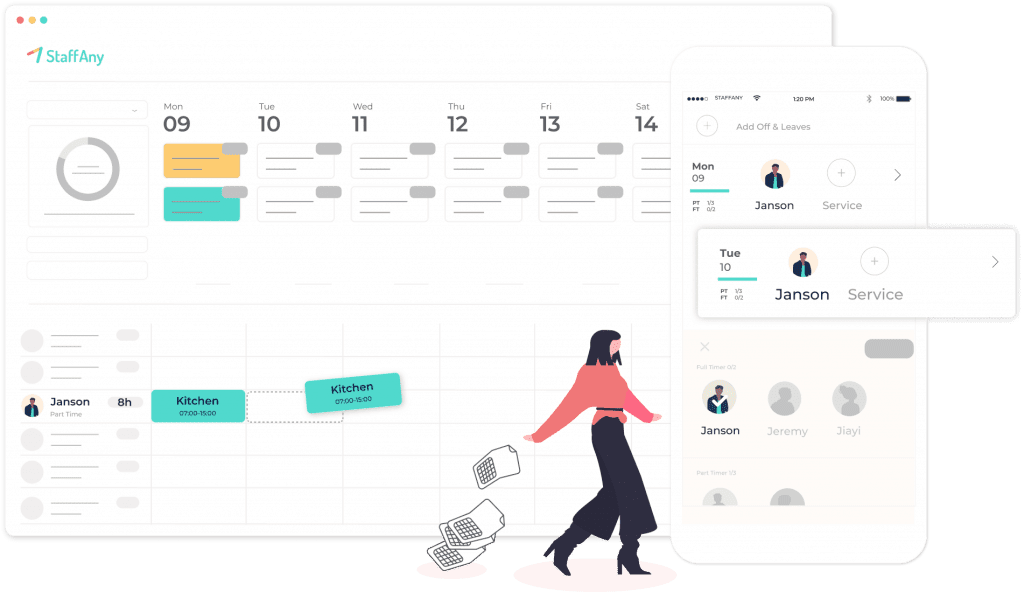Managing restaurant staff is a crucial aspect of running a successful food establishment. It involves overseeing and directing the employees to ensure smooth operations, excellent customer service, and a positive work environment. Effective management of restaurant staff can lead to increased productivity, higher customer satisfaction, and ultimately, greater profitability.
In this article, we will explore the importance of managing restaurant staff and provide you with ten invaluable tips to enhance your management skills. Let’s find out below!
What Does Managing Restaurant Staff Mean?
Managing restaurant staff encompass a wide range of responsibilities, including hiring, training, scheduling, supervising, and motivating employees. It involves overseeing the day-to-day operations, ensuring that the staff follows proper protocols, maintaining a positive work environment, and resolving conflicts promptly. Effective management of restaurant staff is crucial for achieving optimal productivity, efficiency, and customer satisfaction.
Why is Managing Restaurant Staff Important?

Effective management of restaurant staff is vital for several reasons. Let’s explore some of the key benefits it brings:
1. Enhances Operational Efficiency
Properly managing the staff ensures that everyone knows their roles and responsibilities, resulting in a more streamlined operation. When tasks are assigned clearly, employees can work efficiently, reducing the likelihood of errors and delays.
2. Improves Customer Satisfaction
Well-managed staff can provide excellent customer service, which is crucial for building a loyal customer base. Satisfied customers are more likely to return and recommend your restaurant to others, boosting your reputation and revenue.
3. Boosts Employee Morale
When staff members feel valued, supported, and motivated, their job satisfaction increases. Effective management fosters a positive work environment, leading to happier employees who are more likely to go the extra mile to provide outstanding service.
4. Minimises Staff Turnover
High turnover can be costly and disruptive to a restaurant’s operations. By effectively managing the staff, you can create a work environment that encourages employee loyalty, reduces turnover, and saves valuable time and resources spent on hiring and training new personnel.
5. Facilitates Teamwork and Collaboration
A well-managed staff fosters teamwork and collaboration among employees. Encouraging open communication, providing opportunities for skill development, and nurturing a sense of camaraderie among team members can enhance productivity and create a more pleasant working environment.
Read more: 10 Common Problems in Restaurant Management
Best Tips for Managing Restaurant Staff
Now that we understand the meaning and importance of managing restaurant staff, let’s delve into the top 10 tips that can help you excel in this area:
1. Hire the Right People
The foundation of effective staff management begins with hiring the right individuals. Look for candidates who possess the necessary skills, experience, and a positive attitude. Conduct thorough interviews and reference checks to ensure they align with your restaurant’s values and culture. Hiring the right people sets the stage for a cohesive team that can work together harmoniously.
2. Provide Comprehensive Training
Once you have assembled your team, invest in comprehensive training programs. Familiarise new employees with your restaurant’s policies, procedures, and customer service standards. Ongoing training opportunities should also be provided to ensure that staff members are equipped with the skills necessary to excel in their roles. Well-trained employees contribute to smoother operations and improved customer satisfaction.
3. Set Clear Expectations
Communication is key when it comes to managing staff effectively. Clearly communicate job expectations, roles, and responsibilities to your team members. By providing a clear understanding of what is expected from them, you can minimise confusion, improve accountability, and establish a more efficient workflow.
4. Establish Effective Communication Channels
Encourage open and transparent communication among your staff members. Implement regular team meetings to discuss important matters, address concerns, and share updates. Utilise digital communication tools, such as instant messaging platforms or project management software, to facilitate real-time communication and collaboration. Additionally, consider implementing suggestion boxes or anonymous feedback systems to encourage staff members to voice their ideas and concerns.
5. Lead by Example
As a manager, you serve as a role model for your staff. Lead by example and exhibit professionalism, a strong work ethic, and a positive attitude. Your behaviour and work ethic will inspire your employees to follow suit, creating a positive and productive work environment.
6. Recognize and Reward Performance
Acknowledge and appreciate the hard work and achievements of your staff members. Recognise exceptional performance and provide rewards or incentives as appropriate. This can include verbal praise, employee of the month programs, or other forms of recognition. By valuing and celebrating your employees’ efforts, you foster a sense of motivation, loyalty, and job satisfaction.
7. Delegate Tasks Effectively
Effective delegation is a crucial aspect of staff management. Assign tasks based on individual strengths and capabilities. Understand the strengths and interests of each staff member and delegate responsibilities accordingly. This not only ensures that tasks are completed efficiently but also provides opportunities for skill development and growth.
8. Foster a Positive Work Environment
Cultivate a positive work environment that promotes teamwork, respect, and inclusivity. Encourage open communication, collaboration, and mutual support among your staff members. Additionally, strive to create a healthy work-life balance by providing flexible schedules whenever possible and promoting employee well-being.
9. Handle Conflict Proactively
Conflict can arise in any workplace. As a manager, it is important to address conflicts promptly and professionally. Encourage open dialogue, actively listen to all parties involved, and seek a resolution that is fair and equitable. By handling conflicts proactively, you can maintain a harmonious work environment and prevent issues from escalating.
10. Solicit and Act on Feedback
Regularly seek feedback from your staff regarding their experiences, challenges, and suggestions for improvement. Create a culture where employees feel comfortable sharing their thoughts and ideas. Act on their feedback whenever feasible, as it demonstrates that their opinions are valued and contributes to a sense of ownership and engagement.
11. Implement Advanced Restaurant Software
Utilize cutting-edge restaurant tools such as task management platforms to assign and track tasks efficiently. This ensures that your restaurant workers understands their responsibilities for the day and contributes to smoother restaurant operations.
On top of that, a restaurant manager may invest in advanced scheduling software allowing for easy creation and management of employee schedules, and look for features such as shift swapping, automated notifications, and real-time updates.
Streamline your Staff Schedule Management with Employee Scheduling Software

Implementing effective strategies in restaurant industry is vital for success in the fast-paced and dynamic world of managing restaurant staff. By following the ten best tips outlined in this article, you can create a harmonious work environment, boost productivity, and deliver exceptional customer experiences.
However, to further streamline your staff management process, consider leveraging technology. StaffAny offers a employee scheduling system that simplifies scheduling, allowing you to manage and organise your restaurant staff efficiently.
Here are some benefits you can get by implementing StaffAny’s employee schedulling system:
1. Real Time Availabilities
With a connected workforce, know the team availability, who is on leave, and which of your part-timers are available before planning for your A-team in a familiar interface.
2. Schedule Your Staff In One Click with Auto-Scheduling
We understand that speed and accuracy are everything. Just by clicking on the shifts, you instantly assign your staff to a shift. We provide you with schedule templates that can be customised based on your needs.
3. Get Better Visibility of Labour Costs While Scheduling
For restaurant managers who want better cost control, the budgeting feature automatically updates you on weekly labour costs based on your schedule. You can take control of your actual labour costs to optimise and achieve your target manpower budget and Llower your operating costs to increase your take-home profits.
4. Stay in Compliance With Labour Laws
By applying staff schedule system, you as restaurant owner can manage overtime and hours to stay in compliance with labour hours requirements and get visibility over staff real schedule hours across outlets and periods.
5. Reduce Scheduling Error
A good restaurant manager can visualize staff’s schedule across multiple outlets in one view. You may manage your employees across different outlets easily as StaffAny highlights clashing shifts for you.
Embrace these tips, invest in your team, and watch your restaurant business as you master the art of managing restaurant staff!











